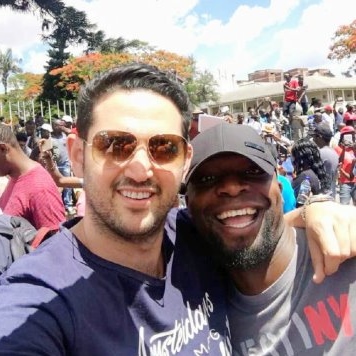click to dowload our latest edition
CLICK HERE TO SUBSCRIBE TO OUR NEWSLETTER


Published
6 years agoon
By
adminTALI FEINBERG
“I think if the MDC [Movement for Democratic Change] comes to power, we are going to have a big problem on our hands,” says a Jewish businessman from Zimbabwe who prefers to remain anonymous.
“The party is very inexperienced. For example, they’re offering to build high-speed trains, which would probably cost the same as the whole GDP of Zimbabwe! And secondly, I don’t think the army or Zanu-PF will accept it. The country is too entrenched in Zanu-PF, which owns so much of the infrastructure.”
This man asked to remain anonymous as declaring himself to be anything other than politically neutral would affect his businesses, and he thinks others in the Jewish community feel the same. “Mugabe leaving was the major thing we all really wanted, and now that it has happened, we just want a smooth, free and fair election that is recognised by the global community and heralds investment,” he says.
His sense is that the upcoming elections have had a paralysing effect on business and investment, as no one wants to conclude a deal or move forward until they know the outcome. He hopes that if President Emmerson Mnangagwa is re-elected, he will stay true to his slogan that “Zimbabwe is open for business” and root out corruption, as well as have a strategy to encourage investment.
Arnold Joffe, chairman of the Harare Hebrew Congregation, says: “The country needs change, and I would be delighted if the opposition came to power.” He feels this way particularly because the MDC declared its intentions to build stronger ties with Israel should it be elected.
However, despite high hopes, he does not think there will be a change of power, and many others in the community feel equally unsure.
Speaking from Israel, Zimbabwean expat Dave Bloom says “more of the same” is the common response he received when he asked community members about the elections.
Bloom is in constant contact with the 80 Jewish souls left in Harare and another approximately 50 in Bulawayo. Said one community member to Bloom: “Whoever wins, the deposed leader will be unhappy. Voting will be the usual smokescreen. I see little chance of real change. We all wish for peace and a pro-business attitude.”
Bloom says there was tempered optimism when Mugabe stepped down last year, and some of the draconian policies were changed. However, he says, essentially Zimbabwe remains in an ongoing political and economic crisis which has spanned nearly 20 years of its nearly 40 years of independence. “The community struggles bravely to maintain a sense of community and support for each other, in the face of endless daily challenges.”
Alana Baranov, a Zimbabwean expat and an expert on the politics of her birth country, says: “The ideal outcome for all Zimbabweans in the upcoming elections would be for a fair and free democratic process to take place, ushering in a new era of real political, economic and social change.
They particularly hope for an improved economy. Zimbabweans across social and economic lines want to be able to withdraw their own money from their own bank accounts.
“Many Zimbabweans are looking to the parliamentary elections with excitement. There are currently a crop of well-respected independent candidates running.”
At the same time, she says, “there are worries that Zanu-PF has not created the right environment in the country for these upcoming elections to be truly free and fair.”
Regarding the MDC’s recent promises to forge stronger ties with Israel, Baranov says: “Israel is also viewed in its context of being a close ally of the United States. So, stronger ties to the Jewish State would fit in with the MDC’s ideals of greater reintegration with the Western world.
“Most Zimbabweans are part of the Christian community, and as such, see Israel as the Holy Land, as [MDC leader] Nelson Chamisa highlighted during his recent trip there. So, there is a religious connection upon which the MDC may build closer ties between the two nations.
“Zimbabwe could also stand to benefit from Israeli investment as well as skills exchanges on key development issues, such as agriculture, if the MDC does reach out to Israel.”
